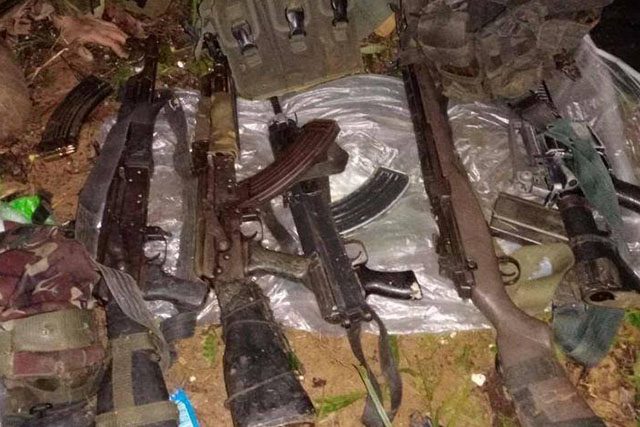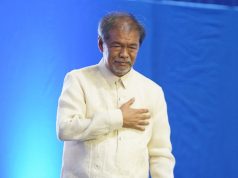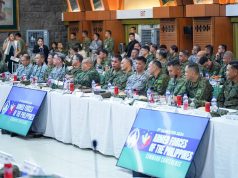
The military was called out after a photo of some of its members posing with the remains of a suspected female armed combatant who was a victim of a shootout with communist rebels circulated on social media on Sunday.
Rep. Eufemia Cullamat (Bayan Muna party-list) denounced the act and said that it was disrespectful of the soldiers to pose for photographs with the slain young woman, who was her daughter.
“She is not a thing, she is not a trophy to be paraded for military propaganda. You did not respect the dead, you are also disrespecting our family’s grief,” she said in a statement in Filipino.
On Sunday, the Philippine Army reported that Jevilyn Campos Cullamat, 22-years-old, was killed in a shootout that occurred in Barangay San Isidro, Marihatag at Surigao del Sur.
She was the sole casualty in the encounter.
A photo from the Philippine Army’s 3rd Special Forces Battalion, uploaded by Philippine News Agency on its Twitter account, showed Jevilyn’s body laid down with weapons that the military has seized while soldiers posed in the back as they held a captured banner.
A report by Kalinaw News, a website run by the Civil-Military Operations Regiment of the Philippine Army, said Jevilyn served as a medic of the New People’s Army and belonged to the Sandatahang Yunit Pampropaganda Platoon of Guerilla Front 19, Northeastern Regional Committee.
Commission on Human Rights spokesperson Jacqueline de Guia said that it was a “cause for when representatives of the government” treat the “death of another Filipino as victory.”
“We cannot find good reason in posing for photos with the lifeless body of Jevilyn Cullamat, alongside seized firearms and communist flags,” she said in a statement.
Gabriela Women’s Party called the action a “desecration” of Jevilyn’s body and said that “only psychopaths and terrorists” would be “capable of taking photo opportunities with a dead body.”
“Making a war souvenir out of the remains of an alleged armed combatant is not only a violation of international humanitarian laws but a manifestation of the military’s lack of basic human decency,” Rep. Arlene Brosas of the party said in a statement.
Some Filipinos on Twitter likewise denounced the military’s sharing of the picture that made its way to social media.
“At bakit nagpipicture ‘tong mga militar sa harap ng nakahalandusay na bangkay? Napakasasahol niyo,” an online user said.
“Ambababoy ng AFP. Posing so calmly with the dead body of a suspected woman rebel? And then using the photo for state propaganda?” another Twitter user asked.
“Why was there (a) need to distribute and thumbnail such a graphic photo? Why even /pose/ like that in the first place? When we did a story on Filipino content moderators last year, a source told me that they would remove bloody, graphic photos of soldiers with dead rebel suspects, posted to taunt and threaten the left. (These) sort of posts should be de-platformed,” Manila reporter Regine Cabato of The Washington Post said.
Meanwhile, Brigadier General Allan Hambala, the commander of AFP’s 401st Infantry Brigade, extended his condolences to the family of Cullamat.
“We send our sincerest condolences to the Cullamat family. We are saddened because we know that she and her family were just victims to the CNT (communist-terrorist)’s destructive and pointless ideology,” he said.
Defense Secretary Delfin Lorenzana said that it was “normal” to take photos of enemies killed in encounters with state forces but added that he has already directed the military to determine how to treat the slain individuals better to protect their dignity.
“Normal naman ‘yung ginagawa ng military eh, ever since eh pinapakita natin ‘yung mga namamatay. Abu Sayyaf, mga MNLF noon, MILF… siguro we will study kung papano natin mapangalagaan naman ‘yung dignidad at saka ‘yung privacy ng mga families,” he said on Monday.
The AFP also denied it desecrated Jevilyn’s remains.
“We vehemently deny that. The photo was taken for reporting and documentation purposes that is required after every encounter,” it said in a statement.
Behind the condemnation
The International Humanitarian Law notes that permanent medical personnel—which Cullamat was—”shall be respected and protected at all times: they may not be made the object of attack but may not participate in hostilities either.”
Gabriela also said that the 1998 Statute of the International Criminal Court states that “committing outrages upon personal dignity” is a “war crime in both international and non-international armed conflicts.”
The 1998 Comprehensive Agreement on Respect for Human Rights and International Humanitarian Law, which was signed by the Philippine government with the National Democratic Front of the Philippines, also prohibits the following:
“Desecration of the remains of those who have died in the course of the armed conflict or while under detention, and breach of duty to tender immediately such remains to their families or to give them decent burial.”









